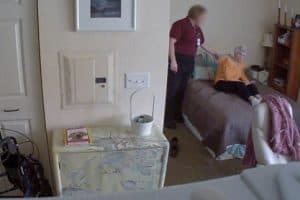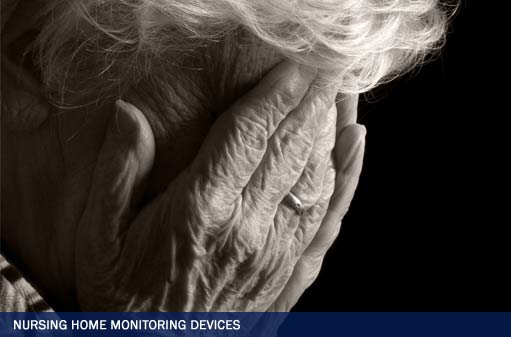
Monitoring Devices In Nursing Home. Illinois has become the fourth state to allow video and audio monitoring devices to be placed in nursing home resident rooms. Illinois governor, Bruce Rauner, signed the legislation, which was previously approved by the General Assembly. Bill HB2462 and passed with overwhelming support and signed into law on August […]

Monitoring Devices In Nursing Home. Illinois has become the fourth state to allow video and audio monitoring devices to be placed in nursing home resident rooms. Illinois governor, Bruce Rauner, signed the legislation, which was previously approved by the General Assembly. Bill HB2462 and passed with overwhelming support and signed into law on August 21, 2015.
New Mexico, Oklahoma, Texas, and Washington have laws in place that mandate nursing homes to allow residents to install electronic monitoring devices, Lori Smetanka, director of the National Long-Term Care Ombudsman Resource Center told The Chicago Tribune. Maryland has guidelines for those nursing homes that voluntarily opt to use such devices at the residents’ request, she added.
Our firm believes that everyone deserves to be treated with dignity, especially those individuals who are unable to protect themselves. Our firm has long been committed to ensuring appropriate, compassionate care for our clients and their loved ones who reside at nursing home facilities and are committed to fighting for justice and financial compensation, when proper care has not been given. These laws provide increased peace of mind to residents of nursing home facilities and their families.


Parker Waichman continues to investigate potential lawsuits on behalf of nursing home residents and their families who allege abuse or neglect at a nursing home facility and also urges local nursing homes to voluntarily permit monitoring devices to be hooked up in residents’ rooms when requested by residents and their family members.
Attorney General Lisa Madigan, who proposed the bill, told The Associated Press (AP) that putting video and audio devices in residents’ rooms would help ensure residents are being treated well; will help ease loved ones’ concerns about family members; and may help to resolve disputes that arise out of suspected or alleged abuse and neglect, providing another “line of defense” for residents. Representative Greg Harris (Democrat-Chicago) and Senator Terry Link (Democrat-Waukegan) sponsored the bill.
The law mandates consent from the resident and roommates, if any, according to Madigan, and takes effect on January 1, 2016. Residents, or their families, will be responsible to pay for the devices, according to the AP. The attorney general announced that the critical provisions of the law:
“Deciding to place a loved one into a nursing facility is extremely difficult, and as Baby Boomers age, more families will be faced with that decision,” said Madigan. “This law makes Illinois one of the first states in the nation to give families peace of mind by allowing them to monitor their loved one’s care when they cannot be present.”
“The vast majority of Illinois’ nursing homes provide high-quality services to their residents, but this law allows commonly used modern technology add another layer of care,” said Harris. “These recording devices will help families ensure that their loved ones are receiving respectful and compassionate care.”
“This is a good, common-sense measure that will help protect nursing home residents and enable families to remain active in their loved ones’ care,” said Link. “I would like to thank the Attorney General for bringing this legislation forward, and I am pleased to see it become law.”
Family caretakers continue to find themselves in the challenging position of placing older relatives and loved ones in the care of nursing home facilities. Finding ethical, appropriate care for senior relatives has left many such caretakers with very limited options with nursing home residents often suffering devastating indignities that include a broad array of abuse and neglect. Sadly, patients often suffer, not just physical pain, but humiliation and, in some cases, death, over inadequate care and abuse.
The National Center on Elder Abuse (NCEA)/Administration on Aging NCEA describes the mistreatment of the elderly, including abuse and neglect, to involve intentional actions that lead to risk of serious harm—“whether intentional or not—to one of the vulnerable members of this demographic by a caregiver or by person who is in a position of trust.” The World Health Organization (WHO) describes elder abuse as “a violation of human rights and a significant cause of illness, injury, loss of productivity, isolation, and despair.”
The 2010 United States Census revealed that some 40.3 million Americans, about 13 percent of the total population, is over the age of 65. This demographic will likely continue growing and is expected to comprise about 20 percent of the population by 2050, according to the NCEA.
Nursing home abuse and neglect is one of the most disturbing horrors taking place in the elder community and impacting our vulnerable loved ones. Health care industry demands are expected to increase with this growing population and, with seniors representing the fastest growing segment of the United States population, the NCEA projects that this effect is expected to continue for decades.
While the NCEA was unable to confirm how many people have, or are, experiencing elder abuse, it does indicate that the incident of such abuse tends to increase with age. What’s more, women are abused more often than men and people who are diagnosed with dementia and Alzheimer’s disease are also more vulnerable to elder abuse.
An NCEA study found that 7.6 – 10 percent of participants indicated having had experienced abuse in the prior year. Meanwhile, based on Adult Protective Services (APS) data, there is an increasing trend in the incidence of elder abuse. Even worse, the incidence of abuse, neglect, and exploitation cases that go undetected and are untreated is described as “overwhelming” by the NCEA. Another study found that, for every case of elder abuse, 14 more cases were not brought to the attention of authorities and, according to the New York State Elder Abuse Prevalence Study, for every known abuse case in programs and agencies, yet another 24 cases are unknown.
Yet another study, conducted by the U.S. General Accountability Office (GAO) and released in 2008, found that abuse issues associated with licensed facilities are underestimated at the state level. Most of these abuse incidents—some 70 percent—indicated in state surveys were missing at least one deficiency; 15 percent missed what was described as a true harm and the immediate jeopardy to a nursing home resident.
In another study released in 2000 and involving 2,000 nursing home residents, 44 percent of participants indicated that they had been abused at a nursing home, while an overwhelming 95 percent indicated having been neglected or having witnessed the neglect of a resident at a nursing home, according to NCEA.
When an elder person experiences abuse, even abuse at the most modest of levels, that individual also experiences a 300 percent increased risk of death, as well as increased psychological distress and increased health problems. In fact, direct medical costs associated with violent injuries to the elderly are believed to add more than $5.3 billion to the nation’s yearly health costs, the NCEA found.
Nursing home facilities are intended to provide safe, compassionate, ethical, clean, and healthy treatment and living spaces for their elderly residents; however, abuse does happen and, when the elderly are injured, those responsible for those residents must be held responsible for their actions.
Signs of abuse may be difficult to detect and victims may be reluctant or unable to report abuse. Although physical abuse is the most obvious type of abuse to detect, there are many ways in which the elderly may be mistreated and abused, including through intimidation, yelling, threats, humiliation, neglect, isolation, terrorizing, and mocking. Some of the signs of elder abuse include:
The personal injury attorneys at Parker Waichman LLP offer free, no-obligation case evaluations. For more information, fill out our online contact form or call 1-800-YOURLAWYER (1-800-968-7529).


